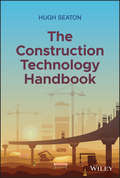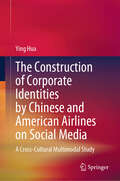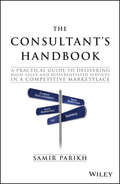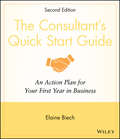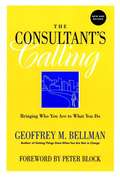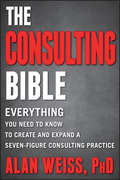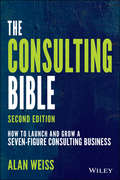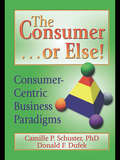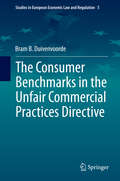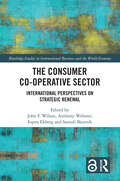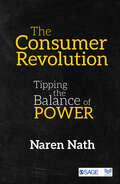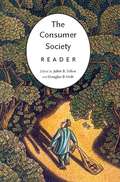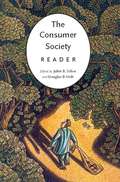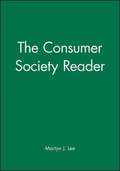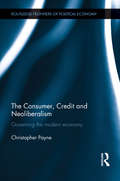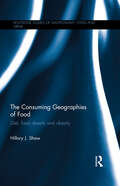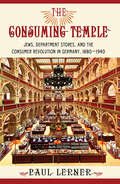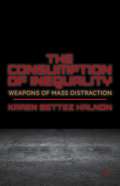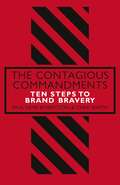- Table View
- List View
The Construction Project: Imagining Reality--The Integrative Thinker's Stance
by Roger L. MartinThis chapter reviews the six essential elements for developing an integrative thinking stance about the world and about yourself-the foundation of your personal knowledge system, and the key to learning how to fashion creative resolutions from opposing ideas.
The Construction Technology Handbook
by Hugh SeatonTired of new software that doesn’t seem to work in the field? Ready to get your teams up to speed and productive with the latest tools? The Construction Technology Handbook takes a ground up, no jargon look at technology in the construction industry. From clear, quickly grasped explanations of how popular software actually works to how companies both large and small can efficiently try out and onboard new tools, this book unlocks new ways for construction field teams, firm owners, managers, leaders, and employees to do business. You’ll learn about: Simple frameworks for making sense of all the new options cropping up How software and data work and how they work together to make your job easier and safer What artificial intelligence really is and how it can help real companies today Tools that are just over the horizon that will, one day, make your job just a little bit easier New and practical resources to help you incorporate an attitude of innovation and technology adoption into your workplace Perfect for general contractors and subcontractors, The Construction Technology Handbook also belongs on the bookshelves of construction technology vendors and construction workers who want to better understand the needs of the construction industry and the inner workings of construction technology, respectively.
The Construction of Corporate Identities by Chinese and American Airlines on Social Media: A Cross-Cultural Multimodal Study
by Ying HuaUsing top Chinese and American airlines as examples, this book approaches the construction of corporate identities on social media, a critical issue in corporate communication, from a cross-cultural multimodal perspective. Through a holistic and systematic multimodal analysis, it provides a comprehensive cross-cultural understanding of corporate identity construction on social media. By developing an integrated social semiotic framework based on registerial cartography in SFL, it investigates the airlines’ registerial activity patterns in terms of macro-level configuration and micro-level multimodal realizations, interprets their situated contextual patterns that delineate the construction of corporate identities and further explains the influence of cultural factors. Given that this book offers theoretical contributions to corporate identity and cross-cultural communication research, practical guidance on PR practices, especially in the context of Chinese enterprises going global, and pedagogical insights for business communication courses, this book will be of particular benefit to researchers in linguistics, management and communication studies, PR practitioners, and both lecturers and learners of business communication courses.
The Consultant's Handbook
by ParikhDelivers the essential practical skills needed to consult and make sharp, well prepared interactions in a wide range of business situations This comprehensive handbook covers the fundamental skills and attitudes required by successful consultants from novice to practitioner level, irrespective of their specialist area. It untangles the key variables present in any consulting service and introduces practical ways to improve their effectiveness based upon the author's experience of helping consulting organisations to develop and excel in the marketplace. The book explores consulting 'from the ground up' steering away from theory and focusing instead on practical application, providing a solid platform upon which to build further domain-specific competence. The Consultant's Handbook provides: An understanding of the key variables that can be addressed in order to improve one's own consulting performance A set of simple practices that can be implemented with immediate benefit to the reader Practical insight into day-to-day real life consulting interactions Confidence to implement the new ideas and approaches
The Consultant's Handbook: Fast-Track Your Career with a Set of Proven Techniques
by Samir ParikhGood news. Consulting skills aren't just for consultants anymore! This best-selling book reveals proven techniques to boost your career—from sharp problem-solving and persuasive arguments to high-performance meetings and ambitious projects. Based on the experience of working with Fortune 500 companies in more than 50 countries this comprehensive handbook pinpoints the fundamental skills required to consult effectively, irrespective of your experience level. Built around ten core themes it untangles the variables that increase the performance of projects, organizations and people. Providing proven techniques that the author has taught to some of the world's top executives, it's an ideal springboard for ambitious career professionals, MBA students and corporate leaders. This new, second edition will equip you with: The tools to consult effectively towards clients and internal stakeholders The ability to maximize your credibility in a variety of situations The arguments required to launch new ideas and win the acceptance of others Techniques to handle people-related obstacles such resistance and political agendas A rich library of examples to guide you in the application of these methods Embark on a journey to accelerate your career and differentiate yourself from others. Learn from a broad base of experience: What works well, what doesn't work well, and winning strategies that have evolved into best practices!
The Consultant's Quick Start Guide
by Elaine BiechThe Consultant's Quick Start Guide offers a practical approach to setting up a consulting business. Throughout the guide, Elaine Biech--author of the best-selling The Business of Consulting--shares both her own secrets as well as those of numerous other successful consultants. With a focus on the business side of consulting, Biech takes you through a painless, fill-in-the-blanks, step-by-step process for setting up your consulting firm. New sections include:Why A Consulting Career--Five Reasons Why You May Be a Good InvestmentHow Much Will Clients Pay?Your first "To Do" ListWhat to call your businessCreating and writing Business PlansOffice Location OptionsSetting up your office, including Furnishing Your Office and planning your Technical NeedsElectronic Records, including Monthly Expense Records, Revenue Projections, and InvoicingStaying Organized, including a Session PlannerDetermining your market nicheCreating your marketing planDeveloping your websiteReviewing your first year with your familyElectronic resource list, available onlineSkills And Knowledge Required of Consultants
The Consultants Calling: Bringing Who You Are To What You Do (The Jossey-Bass Business & Management Series)
by Geoffrey BellmanGeoffrey Bellman reveals how to make the job rewarding both financially and personally as he examines the practical issues of managing time,clients, and money as well as such broader concerns as how to balance work with family life. <P><P>At once practical and personal, this book is for all types of consultants, all those who work with consultants, and all those who dream of being consultants.
The Consulting Bible
by Alan WeissEverything you need to know about building a successful, world-class consulting practiceWhether you are a veteran consultant or new to the industry, an entrepreneur or the principal of a small firm, The Consulting Bible tells you absolutely everything you need to know to create and expand a seven-figure independent or boutique consulting practice. Expert author Alan Weiss, who coaches consultants globally and has written more books on solo consulting than anyone in history, shares his expertise comprehensively.Learn and appreciate the origins and evolution of the consulting professionLaunch your practice or firm and propel it to top performanceImplement your consulting strategies in public and private organizations, large or small, global or domesticSelect from the widest variety of consulting methodologiesAchieve lasting success in your professional career and personal goalsThe author is recognized as "one of the most highly regarded independent consultants in America" by the New York Post and "a worldwide expert in executive education" by Success MagazineWhether you're just starting out or looking for the latest trends in modern practice, The Consulting Bible gives you an unparalleled toolset to build a thriving consultancy.
The Consulting Bible: How to Launch and Grow a Seven-Figure Consulting Business
by Alan WeissThe new edition of bestselling real-world guide to consultancy success, from the “Rock Star of Consulting” Alan Weiss The second edition of The Consulting Bible: Everything You Need to Know to Create and Expand a Seven-Figure Consulting Practice remains the most comprehensive and practical guide to the consulting profession, from launch to high growth, from marketing to implementation. Legendary consultant, speaker, and bestselling author Alan Weiss shows you how to create an independent or boutique consulting practice and take it to seven-figure success. Step-by-step, this invaluable resource guides you through attracting clients, maximizing your value, and achieving your career goals. In the decade since the first publication of The Consulting Bible, an array of significant developments has dramatically impacted the consulting profession: shifts in social consciousness, the Covid-19 pandemic, tele-consulting and virtual meetings, the globalization of the economy, the growth of social media, and many more. This exhaustively revised new edition provides specific approaches and techniques for mastering the new consulting environment and turning volatility and disruption into unlimited opportunities. Designed to help you become the authority and expert that organizations turn to again and again, this book is your one-stop resource for: Building a strong global brand that draws people to you Marketing remotely to reduce costs and allow for higher fees Mastering the latest implementation techniques Forging strong relationships with the buyers of a new generation Selecting the consulting methodology that best fits your requirements Writing proposals and creating testimonials and references Using advanced technology to sell and deliver your services Written for newcomers and veterans alike, The Consulting Bible: Everything You Need to Know to Create and Expand a Seven-Figure Consulting Practice, Second Edition, is essential reading for every solo consultant, entrepreneur, and principal of a small consulting firm.
The Consumer . . . or Else!: Consumer-Centric Business Paradigms
by Donald F Dufek Camille P Schuster"The customer is the only one who can fire all of us." -Sam Walton Doing business in today's economy and surviving requires a new paradigm. Who are at the center of this new approach to doing business? CONSUMERS. Historically, power struggles have raged between suppliers and distributors. Recently, both parties awakened to the fact that neither of them has the ultimate power . . . it now resides solely with the consumer. This valuable book describes what demassification of the consumer market means and will show you how-and why-businesses must adapt to succeed. Handy charts, tables, and illustrations make the information easy to understand, and fascinating sidebar quotations from well-known leaders of various industries-Sam Walton, Jack Welch, and many more-give the book a unique and memorable flavor. "Consumers," say the authors, "not only demand higher quality and lower prices, but also expect convenient, quick, customized service. They expect in-stock conditions and quality. They demand value and respect. Global markets mean large numbers of consumers, but these consumers want to be treated as individuals, and the mass market no longer exists. Companies in industries from financial services to groceries to consumer goods to health care to hardware to automobiles are adopting these new business processes and winning in the marketplace. Their competitors are falling by the wayside." This essential book: examines the factors that are shaping the current business environment and looks at the re-orientation of today's consumer, presenting global perspectives on these vital issues explores this new consumer-centric approach from the perspectives of suppliers, intermediaries, and retailers, as well as the business processes being used to create more efficient supply chains and more effective demand fulfillment processes shows you the tools that can be used to implement this new business paradigm in the areas of technology, internal business processes, and collaboration answers frequently asked questions shares the success stories of Rite Aid, Southwest Airlines, Starbucks, Snap-On Tools, National Semiconductor, and others! After addressing the issues of why business must change and examining the significance of a global business environment, The Consumer . . . or Else! addresses each element of the new business paradigm: the new role of consumers major players, including the shift in the business processes of retailers and manufacturers and the role of intermediaries new business processes, with a focus on technology, internal coordination, and collaboration Companies from Dell Computer to Del Monte are putting consumers first and reaping the sales benefits. General Mills will soon provide consumers with the opportunity to create and name their own custom cereal. As the authors point out, "The business process is changing-changing the way product flows, the way information flows, and the way cash flows. Companies that recognize this need to change will hold huge competitive advantages, and the companies that fail to adapt will simply not be here in the future." Let The Consumer . . . or Else!: Consumer-Centric Business Paradigms be your guidebook to this challenging new business climate.
The Consumer Benchmarks in the Unfair Commercial Practices Directive
by Bram B. DuivenvoordeThis book investigates the regime of consumer benchmarks in the Unfair Commercial Practices Directive and explores to what extent this regime meets each of the goals of the Directive. In particular, it assesses whether the consumer benchmarks are suitable in terms of achieving the three goals of the Directive: achieving a high level of consumer protection, increasing the smooth functioning of the internal market, and improving competition in the market as such. In addition to providing a thorough analysis of the consumer benchmarks and their relationship to the goals of the Directive, at a more practical level, the book provides insight into the working and consequences of the benchmarks that can be used in the evaluation of the Unfair Commercial Practices Directive and its application by the CJEU. This assessment is important because the Directive, while promising to regulate unfair commercial practices in a way that achieves the Directive's goals, has removed the possibility for Member States to regulate unfair commercial practices themselves.
The Consumer Co-operative Sector: International Perspectives on Strategic Renewal (Routledge Studies in International Business and the World Economy)
by John F. Wilson Anthony Webster Espen Ekberg Samuli SkurnikGlobally, consumer co-operation has experienced a difficult period since the 1970s. Large scale failures in France, Germany and Austria were accompanied by loss of market share in the UK (including the failure of the Scottish Co-operative Wholesale Society and its takeover by its English counterpart). Even in the Nordic countries, where consumer co-operation has always been more robust, new challenges from the non-co-operative sector had to be confronted. How did co-operative organizations in different countries cope with these challenges? What were the processes of strategic renewal that they undertook? How successful were they? These are the key questions that the collection will address, culminating in an analysis by the editors of the effectiveness of strategic renewal in the co-operative sector. This book is a study of strategic renewal in the consumer co-operative sector, using eleven international case-studies to demonstrate how the concept has been applied over the last fifty years.
The Consumer Co-operative Sector: International Perspectives on Strategic Renewal (Routledge Studies in International Business and the World Economy)
by John F. Wilson Anthony Webster Espen Ekberg Samuli SkurnikGlobally, consumer co-operation has experienced a difficult period since the 1970s. Large scale failures in France, Germany and Austria were accompanied by loss of market share in the UK (including the failure of the Scottish Co-operative Wholesale Society and its takeover by its English counterpart). Even in the Nordic countries, where consumer co-operation has always been more robust, new challenges from the non-co-operative sector had to be confronted. How did co-operative organizations in different countries cope with these challenges? What were the processes of strategic renewal that they undertook? How successful were they? These are the key questions that the collection will address, culminating in an analysis by the editors of the effectiveness of strategic renewal in the co-operative sector. This book is a study of strategic renewal in the consumer co-operative sector, using eleven international case-studies to demonstrate how the concept has been applied over the last fifty years.
The Consumer Revolution: Tipping the Balance of Power
by Naren NathIn this ground breaking book, Naren Nath provides a sweeping narrative of revolutions since the dawn of human civilization, leading up to the current and most impactful of them all—the consumer revolution. The book paints a gripping picture of consumers melding together, akin to nuclear fusion, to unleash unprecedented amount of energy and creativity, setting in motion a stunning transfer of power from traditional institutions. In doing so, it tosses up myriad new business ideas, and also highlights some of the sinister implications if the revolution is not harnessed correctly. The Consumer Revolution provides a fascinating context and rationale for some of the biggest current events and trends around the world. It is a stirring call for action to billions of everyday consumers to express their will and wield power in this ultimate doctrine of consumer empowerment.
The Consumer Society Reader
by Juliet Schor D. B. HoltThe Consumer Society Reader features a range of key works on the nature and evolution of consumer society. Included here is much-discussed work by leading critics such as Jean Baudrillard, Susan Bordo, Dick Hebdige, bell hooks, and Janice Radway. Also included is a full range of classics, such as Frankfurt School writers Adorno and Horkheimer on the Culture Industry; Thorstein Veblen's oft-cited writings on "conspicuous consumption"; Betty Friedan on the housewife's central role in consumer society; John Kenneth Galbraith's influential analysis of the "affluent society"; and Pierre Bourdieu on the notion of "taste.""Consumer society--the 'air we breathe,' as George Orwell has described it--disappears during economic downtruns and political crises. It becomes visible again when prosperity seems secure, cultural transformation is too rapid, or enviornmental disasters occur. Such is the time in which we now find ourselves. As the roads clog with gas-guzzling SUVs and McMansions proliferate in the suburbs, the nation is once again asking fundamental questions about lifestyle. Has 'luxury fever,' to use Robert Frank's phrase, gotten out of hand? Are we really comfortable with the 'Brand Is Me' mentality? Have we gone too far in pursuit of the almighty dollar, to the detriment of our families, communities, and natural enviornment? Even politicians, ordinarily impermeable to questions about consumerism, are voicing doubts... [and] polls suggest majorities of Americans feel the country has become too materialistic, too focused on getting and spending, and increasingly removed from long-standing non-materialist values." -From the introduction by Douglas B. Holt and Juliet B. Schor
The Consumer Society Reader
by Juliet Schor D. B. HoltThe Consumer Society Reader features a range of key works on the nature and evolution of consumer society. Included here is much-discussed work by leading critics such as Jean Baudrillard, Susan Bordo, Dick Hebdige, bell hooks, and Janice Radway. Also included is a full range of classics, such as Frankfurt School writers Adorno and Horkheimer on the Culture Industry; Thorstein Veblen's oft-cited writings on "conspicuous consumption"; Betty Friedan on the housewife's central role in consumer society; John Kenneth Galbraith's influential analysis of the "affluent society"; and Pierre Bourdieu on the notion of "taste.""Consumer society--the 'air we breathe,' as George Orwell has described it--disappears during economic downtruns and political crises. It becomes visible again when prosperity seems secure, cultural transformation is too rapid, or enviornmental disasters occur. Such is the time in which we now find ourselves. As the roads clog with gas-guzzling SUVs and McMansions proliferate in the suburbs, the nation is once again asking fundamental questions about lifestyle. Has 'luxury fever,' to use Robert Frank's phrase, gotten out of hand? Are we really comfortable with the 'Brand Is Me' mentality? Have we gone too far in pursuit of the almighty dollar, to the detriment of our families, communities, and natural enviornment? Even politicians, ordinarily impermeable to questions about consumerism, are voicing doubts... [and] polls suggest majorities of Americans feel the country has become too materialistic, too focused on getting and spending, and increasingly removed from long-standing non-materialist values." -From the introduction by Douglas B. Holt and Juliet B. Schor
The Consumer Society Reader
by Juliet B. Schor Douglas B. HoltThis books features a range of key discussions about consumer society. Included are much-discussed work by leading ritics such as Jean Baudrillard, Susan Bordo, Dick hebdige, bell hooks, and Janice Radway. Also included are a full range of classics, such as Frankfurt School writers Adorno and Horkheimer on the Culture Industry; Thorstein Veblen's oft-cited writings on "conspicuous consumption"; Betty Friedan on the housewife's central role in consumer society; John K. Galbraith's influential analysis of the "affluent society"; and Pierre Bourdieu on the notion of "taste".
The Consumer Society Reader
by Douglas B. Holt Juliet SchorThe Consumer Society Reader features a range of key works on the nature and evolution of consumer society. Included here is much-discussed work by leading critics such as Jean Baudrillard, Susan Bordo, Dick Hebdige, bell hooks, and Janice Radway. Also included is a full range of classics, such as Frankfurt School writers Adorno and Horkheimer on the Culture Industry; Thorstein Veblen's oft-cited writings on "conspicuous consumption"; Betty Friedan on the housewife's central role in consumer society; John Kenneth Galbraith's influential analysis of the "affluent society"; and Pierre Bourdieu on the notion of "taste.""Consumer society--the 'air we breathe,' as George Orwell has described it--disappears during economic downtruns and political crises. It becomes visible again when prosperity seems secure, cultural transformation is too rapid, or enviornmental disasters occur. Such is the time in which we now find ourselves. As the roads clog with gas-guzzling SUVs and McMansions proliferate in the suburbs, the nation is once again asking fundamental questions about lifestyle. Has 'luxury fever,' to use Robert Frank's phrase, gotten out of hand? Are we really comfortable with the 'Brand Is Me' mentality? Have we gone too far in pursuit of the almighty dollar, to the detriment of our families, communities, and natural enviornment? Even politicians, ordinarily impermeable to questions about consumerism, are voicing doubts... [and] polls suggest majorities of Americans feel the country has become too materialistic, too focused on getting and spending, and increasingly removed from long-standing non-materialist values." -From the introduction by Douglas B. Holt and Juliet B. Schor
The Consumer Society Reader
by Martyn J. LeeThe Consumer Society Reader is the most substantial collection of classic and contemporary readings on consumption and consumer society for students of cultural studies and sociology of culture. From Karl Marx to Jean Baudrillard, the volume introduces students and researchers to the topics, themes, and preoccupations of twentieth-century consumer culture.
The Consumer, Credit and Neoliberalism: Governing the Modern Economy (Routledge Frontiers Of Political Economy Ser. #152)
by Christopher PayneThis book is an investigation into the economic policy formulation and practice of neoliberalism in Britain from the 1950s through to the financial crisis and economic downturn that began in 2007-8. It demonstrates that influential economists, such as F.A. Hayek and Milton Friedman, authors at key British think tanks such as the Institute of Economic Affairs and the Centre for Policy Studies, and important political figures of the Thatcher and New Labour governments shared a similar conception of the consumer. For neoliberals, the idea that consumers were weak in the face of businesses and large corporations was almost offensive. Instead, consumers were imagined to be sovereign agents in the economy, whose consumption decisions played a central role in the construction of their human capital and in the enabling of their aspirations. Consumption, just like production, came to be viewed as an enterprising and entrepreneurial activity. Consequently, from the early 1980s until the present day, it was felt necessary that banks should have the freedom to meet the borrowing needs of consumers. Credit rationing would be a thing of the past. Just like businesses, consumers and households could use debt to expand their stock of personal assets. By utilizing the method of French philosopher Michel Foucault this book provides an original analysis of the policy ideas and political speeches of key figures in the New Right, in government and at the Bank of England. And it addresses the key question as to why policy-makers both in Britain and the United States did little or nothing to stem rising consumer and household indebtedness, instead always choosing to see increasing house prices and homeownership as a positive to be encouraged.
The Consuming Geographies of Food: Diet, Food Deserts and Obesity (Routledge Studies of Gastronomy, Food and Drink)
by Hillary J. ShawThe consumption and distribution of food, as well as its production, has become a major public policy issue over the past few decades; what we eat is no longer merely a private matter but carries significant externalities for wider society. Its increasing significance within the public arena implies a dissonance regarding the boundaries of food; where do we draw the line between food as private and food as public? What are the rights of society to impinge upon individual food consumption, and what conflicts will ensue when this boundary is disputed? The Consuming Geographies of Food explores these multiple issues of food across different regions of the world from the consumer’s perspective. It uniquely explicates the factors that lead customers towards certain typologies of consumption and towards certain types of retailing, offering a comprehensive review of the obesity problem, the phenomenon of food deserts and the issue of exclusion from a healthy diet. It then considers the effects of food on the consumer, the dynamic relationship between food and people, and the issue of food exclusion before concluding with possible futures for food consumption, from low-technology projects to high-technology scenarios. Based on original research into food access, ethics and consumption in both developed and less-developed countries this book will be of interest to students, researchers and academics in the fields of geography, economics, hospitality health, marketing, nutrition and sociology.
The Consuming Temple: Jews, Department Stores, and the Consumer Revolution in Germany, 1880–1940
by Paul LernerDepartment stores in Germany, like their predecessors in France, Britain, and the United States, generated great excitement when they appeared at the end of the nineteenth century. Their sumptuous displays, abundant products, architectural innovations, and prodigious scale inspired widespread fascination and even awe; at the same time, however, many Germans also greeted the rise of the department store with considerable unease. In The Consuming Temple, Paul Lerner explores the complex German reaction to department stores and the widespread belief that they posed hidden dangers both to the individuals, especially women, who frequented them and to the nation as a whole.Drawing on fiction, political propaganda, commercial archives, visual culture, and economic writings, Lerner provides multiple perspectives on the department store, placing it in architectural, gender-historical, commercial, and psychiatric contexts. Noting that Jewish entrepreneurs founded most German department stores, he argues that Jews and “Jewishness” stood at the center of the consumer culture debate from the 1880s, when the stores first appeared, through the latter 1930s, when they were “Aryanized” by the Nazis. German responses to consumer culture and the Jewish question were deeply interwoven, and the “Jewish department store,” framed as an alternative and threatening secular temple, a shrine to commerce and greed, was held responsible for fundamental changes that transformed urban experience and challenged national traditions in Germany’s turbulent twentieth century.
The Consumption of Inequality: Weapons of Mass Distraction
by Karen Bettez HalnonThe fads, fashions, and media in popular consumer culture frequently make recreational and ideological "fun" of poverty and lower class living. In this book, Halnon delineates how incarceration, segregation, stigmatization, cultural and social consecration, and carnivalization work in the production and consumption of inequality.
The Contagious Commandments: Ten Steps to Brand Bravery
by Paul Kemp-Robertson Chris BarthContagion may alarm doctors but marketers thrive on it. Some concepts are so compelling you have to share them. But what makes an idea so infectious you can't keep it to yourself? And how can brands produce these kinds of ideas intentionally rather than by chance?Contagious, the globally renowned intelligence resource for the marketing industry, is dedicated to identifying and interrogating the world's most exceptional creative trends. And in The Contagious Commandments, Paul Kemp-Robertson and Chris Barth condense this valuable research into ten strategic takeaways for your own marketing revolution.Taking inspiration from disruptive campaigns from the likes of Patagonia, Nike, Safaricom, BrewDog, LEGO, Kenco, and dozens more, The Contagious Commandments explores how companies fuse creativity, technology and behavioural psychology to achieve truly original marketing ideas that have a positive impact on society and profits - and how your brand can too.
The Container Store
by Aldo Sesia Zeynep Ton Tatiana SandinoThe Container Store (TCS) is a Texas-based retailer of organization and storage solutions. The company prides itself in taking care of its employees first and its co-founder and CEO Kip Tindell practices Conscious Capitalism. Since it beginnings in 1978, TCS grew to a chain of around 70 stores located in over 20 states by 2013. Tindell believed TCS's employee-first culture and the seven Foundation Principles, which guided the company, were what differentiated the company from other retailers. With plans to grow to 300 stores, TCS went public in late 2013. Since its IPO same store sales have suffered and the company's stock in early 2016 was trading well below its IPO price. As such, the company's culture and Foundation Principles were being put to the test.

